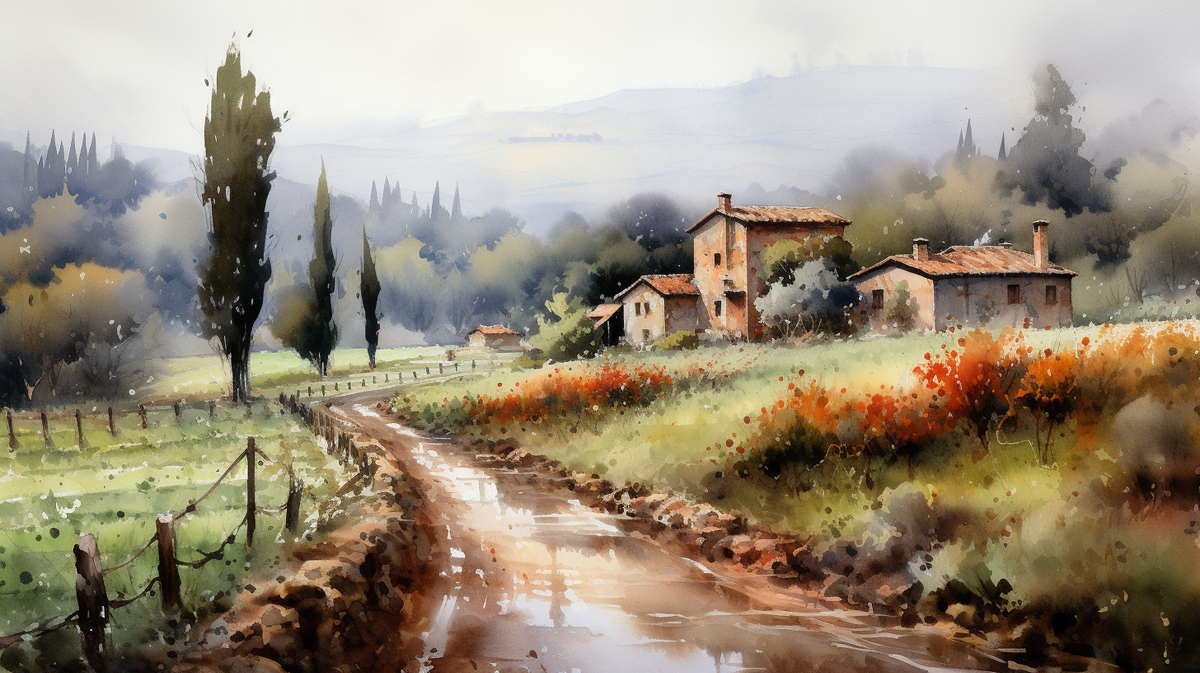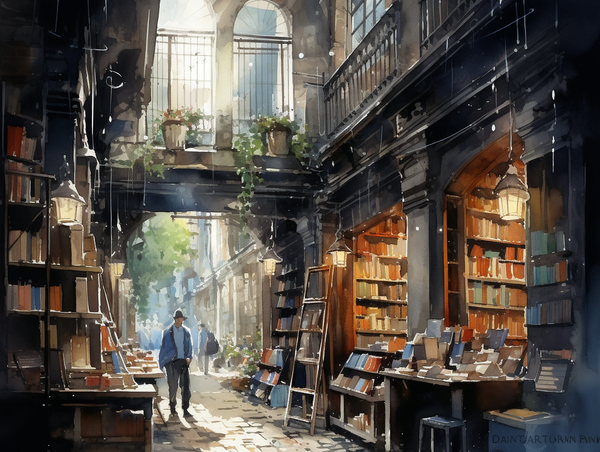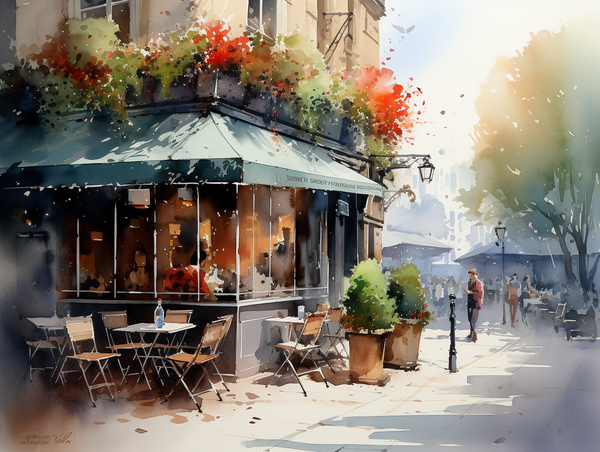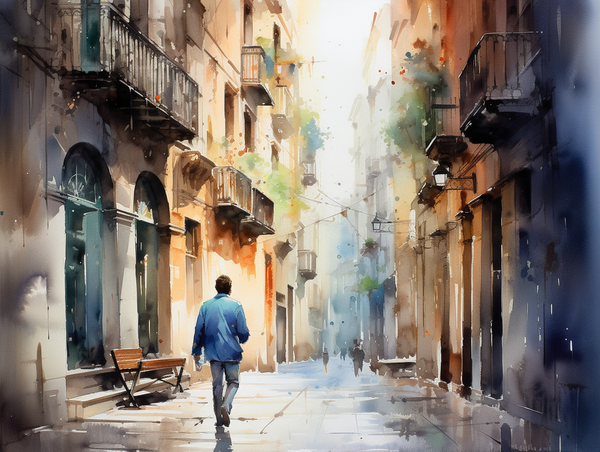Into the delicious gloom
Through the leaded windows of Cotswald's cottages, I saw warm lights flicker on, one by one, like fireflies waking at dusk. The light spilt onto the rain-slicked cobblestones, creating pools of gold that mirrored the sky's own tears.

The first droplet hit my nose as I stepped off the bus in Bourton-on-the-Water, and I couldn't help but smile. It was a day meant for travel and ever predictable in its unpredictability, the English weather, had welcomed me with its signature greeting. The locals of Arlington Row barely noticed, continuing their afternoon routines with that particularly British blend of stoic acceptance and quiet pride in their weather's dramatic flair.
I had come prepared, of course. My grey raincoat, which had seemed almost dour in its blandness back in London, now blended beautifully against the gradient of greys above. The Windrush, running through the heart of the village, was practicing its own form of defiance – remaining impossibly clear despite the weather's best attempts to disturb its surface.
"Bit of a damp one today, love," said the elderly Tea Lady at the Bakery on the Water, as she handed me a scone over the piping steam rising from my cup of tea. The warmth of the freshly baked good seeped through the paper bag and into my cold fingers. Her eyes crinkled at the corners when she smiled, like well-worn lines in a favourite book.
It was a steady drizzle, transforming the honey-coloured Cotswold stone buildings into deeper, richer versions of themselves. A group of ducks, apparently holding an important conference by the low stone bridge, seemed to be the only ones truly appreciating the weather.
Arlington Row stood before me like a painting come to life, washed and laundered in the rain. The famous 14th-century weavers' cottages, their honey-limestone walls darkened to the colour of aged bread crust by the falling water, emerged from the mist like a forgotten fairytale. Each raindrop traced the ancient grooves of the stone, creating tiny rivers that glistened against the weathered surface.
The steep pitched roofs, with their characteristic Cotswold slate tiles layered like fish scales, shed water in synchronised rivulets. Moss, in various shades of emerald and sage, had grown plump and vivid with moisture between the stones. They were now bursting with life in the rain. Tendrils of ivy, slick with rain, climbed the walls with deliberate patience, their leaves catching droplets that sparkled like tiny diamonds.
In front of the cottages, lulled the River Coln, its surface stippled by raindrops, creating concentric rings that danced and merged in an endless water ballet. A mallard duck, undeterred by the weather, glided across the water leaving a V-shaped wake, while her ducklings followed in a wobbling line, their downy feathers beading with water.
Through the leaded windows of the cottages, I saw warm lights flicker on, one by one, like fireflies waking at dusk. The light spilt onto the rain-slicked cobblestones, creating pools of gold that mirrored the sky's own tears. The rain softened all sounds: footsteps became whispers, voices turned to murmurs, and the whole moment was wrapped in a cocoon of gentle white noise that felt like a mothers lullaby.
The gardens, though drenched, revelled in their soaking. Red roses bowed their heavy heads, releasing occasional showers as the wind brushed past. Lavender trees stood straight and proud, their purple blooms intensified by the moisture, releasing their gossamer fragrance into the humid air. A blackbird, its feathers slicked back like a gentleman's hair, picked its way between puddles, stopping occasionally to pull an opportunistic worm from the softened earth.
The ancient limestone, normally honey-gold, deepened to the colour of scotch whisky, each drop tracing centuries-old pathways down the walls. The scene before me wasn't just pretty - it was alive, breathing, dripping with stories.
They say there’s no such thing as bad weather, only unsuitable clothing. At that moment, I was thankful for my rain gear. While my outer layers looked battered and drenched, I was snug and warm inside, like toast fresh from the oven. After an hour of wandering along the river and past the picturesque cottages, hunger began to gnaw at me—I was definitely ready to pause and refuel.
I found shelter in The Cornflower Tea Room, a place that seemed to exist in a permanent state of Sunday afternoon circa 1947. The ceiling beams were low enough that tall patrons had to develop a sort of instinctive duck-and-weave routine, and the wallpaper featured a pattern that could only be described as "aggressive chintz."
Steam rose from my pot of Earl Grey like morning mist over the hills. Through diamond-paned windows gone impressionistic with rivulets of rain, I watched two young lovers share an umbrella, their laughter carrying across the dampened air. They knew what I was learning - that rain creates intimate spaces, turns ordinary moments into poetry.
"First time in the Cotswolds?" asked the waiter, a young man with the kind of authentic local accent that BBC period dramas would kill for. When I nodded, he grinned. "You've picked a proper day for it then. Rain makes the stones sing."
I wasn't sure if he was being poetic or literal until I stepped outside again and heard it – the soft, almost musical sound of raindrops on centuries-old stone. The cottages didn't just sit in the landscape; they grew from it, each weathered block telling stories of countless other rainy afternoons.
Walking along the river path, I passed gardens that defied the very concept of winter. Every narrow lane became a stream of liquid silver, leading to unexpected discoveries. Behind one corner, I found a cottage garden where roses, heavy with raindrops, bent their heads like dancers taking a bow and hydrangeas nodded heavily in the rain.. Each petal held perfect spheres of water that reflected the entire world in miniature.
The path led me to a small bridge, where I stopped to watch the water. A family of swans glided past, the parents bookending their cygnets like attentive bodyguards. The rain had thinned the usual crowds, and for a moment, I had this corner of the Cotswolds all to myself. Well, myself and the swans, who regarded me with that mixture of disdain and tolerance that seems to be standard issue for British waterfowl.
In the distance, sheep dotted the hillsides like smudges of cloud that had fallen to earth. The rain softened their outlines, making them look like impressionist paintings come to life. A farmer's dog, some variety of border collie, barked a distant hello that echoed across the valley.
I found myself in the Model Village, a quarter-scale replica of Bourton-on-the-Water itself. The rain made it look like a fairy tale in miniature, with tiny streams of water running down tiny slate roofs. Standing there, looking at a small version of the village while standing in the actual village, created a sort of existential hall of mirrors. I half expected to find an even smaller version of myself, complete with red raincoat, peering at an even smaller Model Village.
By late afternoon, I had developed what I called the Cotswold Waddle – a peculiar walking technique that involved avoiding puddles while trying to look dignified on slippery limestone pavements. The locals, naturally, glided about as if friction was optional and balance was guaranteed by ancient village bylaws.
As dusk approached, The Lamb Inn beckoned with its golden light spilling onto the wet cobblestones. Inside, raincoats steamed gently by the fire, and conversations hummed like bees in summer. The fireplace was doing its best to combat several centuries of built-in drafts. The pub dog, a elderly golden retriever named Winston, had apparently appointed himself my personal foot-warmer. The rain tapped against leaded windows while I savoured a bowl of cottage pie that tasted like it had been made by someone's grandmother – not my grandmother specifically, but the sort of grandmother who believes that butter is a food group and measurements are for the faint-hearted.
"Planning to stay until it stops?" asked the bartender, nodding toward the windows. I looked outside at the rain, which had settled into the kind of steady rhythm that suggested it was getting comfortable for the long haul.
"I think," I said, watching the last of the daylight turn the wet stones to gold, "that would be missing the point entirely."
Winston sighed in agreement, or perhaps it was just a coincidentally timed snore. Either way, he had the right idea. Some places aren't meant to be seen in perfect weather. Some places, like the Cotswolds, save their true beauty for those who don't mind a little rain, who can see how water brings the old stones to life and turns an ordinary village into something magical.
From the window seat, I watched as paths turned to mirrors, reflecting the warm glow of pub windows and street lamps. Each puddle became a portal to another world, deep and mysterious. A church bell tolled in the distance, its sound softened by the rain into something almost musical, like a deep note from a cello.
As I waited for my taxi back to the station, I watched two local women hurrying past under a shared umbrella, deep in conversation about someone called Margaret and her questionable decision to paint her front door purple. The rain continued to fall, the stones continued to sing, and somewhere in the distance, a church bell tolled the hour, its sound muffled and softened by the wet air.
This was the Cotswolds I would remember – not from a postcard or a tourist brochure, but alive and wet and real. A place where the rain didn't spoil the day but rather revealed the village's true character, one drip at a time. As my taxi arrived, I took one last look at Bourton-on-the-Water, its lights now beginning to twinkle in the early evening gloom, each reflection dancing on the wet pavements like stars fallen to earth.
The taxi driver took my wet umbrella and gave me a knowing smile. "Beautiful day for it," he said, without a hint of irony. I smiled. As the taxi wound its way toward the station, his windshield wipers kept time with the rain's rhythm, and as we drove through lanes turned to liquid silver, past cottages glowing like ember-lit jewels in the gloaming, I understood completely. I pressed my forehead against the cool window, watching this magical world slip by. Behind us, the villages settled into the delicious gloom, their lights twinkling through the rain like stars fallen to earth, beckoning future travelers to discover their rain-soaked secrets.
And I knew, with absolute certainty, that I would return - not despite the rain, but hoping for it.
I write 'cos words are fun. More about me here. Follow @hackrlife on X
.




